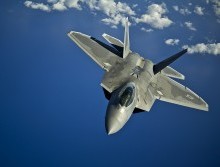One of the most commonly suggested ways for the United States or Europe to get militarily involved in the Syrian civil war is to set up a no-fly zone. As US fighter jets patrol the skies and take down or scare off Syrian jets and helicopters, the Syrian regime would lose one of its greatest advantages over the rebels—air attacks.
But one of the greatest threats to a potential no-fly zone is an advanced air defense system from Russia, and the Russians are refusing to cancel shipments of the S-300 system to Syria. The good news for the West so far? Israel says the S-300 hasn’t arrived in Syria, at least not yet.
Israeli Defense Minister Moshe Ya’alon on Tuesday said deliveries of the S-300 “have not taken place” and he hopes they don’t, according to a statement released by his office. The advanced air defense system, which can shoot down enemy planes and missiles, would be a clear upgrade on Syria’s current weaponry.
Not only would that make a no-fly zone more difficult, it would also make it harder to stop terrorists from acquiring devastating Syrian weapons. Israel has reportedly bombed Syrian arms bound for Hezbollah terrorists in Lebanon multiple times, in an effort to prevent Hezbollah from acquiring “game-changing” weapons.
Ya’alon said a future Russian delivery of the S-300 to Syria is “clearly” a threat to Israel, even though he could not say right now that there is a “step-up” in the shipment of the Russian air defense system. “But if, by some misfortune, they arrive in Syria, we will know what to do,” said Ya’alon.
Remember the goal of the West is to try and end the Syrian civil war as soon as possible, all while changing Syria from a dictatorship to a democracy. While a decision to launch a no-fly zone hasn’t been made yet, it would be one way to try and force the regime to back down. The two-year old civil war has killed tens of thousands of Syrian civilians and has opened the door for terrorists to use the chaos to potentially acquire Syria’s chemical weapons.
The conflict also threatens to spill into neighboring countries—such as Lebanon—and start a much broader war that could lead to higher oil prices. Israel, by the way, is watching the Syrian fight, but doesn’t believe that a massive war between themselves and Syria is coming soon.
Ya’alon said Syria is “deterred by us,” even if the regime is currently slaughtering its own citizens. And while Syria has that large stockpile of chemical weapons, Ya’alon doesn’t expect anyone to attack Israel with those weapons of mass destruction—which is viewed as an extreme, or “unconventional,” attack.
“We will be prepared and ready for any future developments. In our assessment, we do not see anyone who is about to try and test us in the area of unconventional attacks in the foreseeable future,” he said.
(By Joshua Spurlock, www.themideastupdate.com, May 29, 2013)

